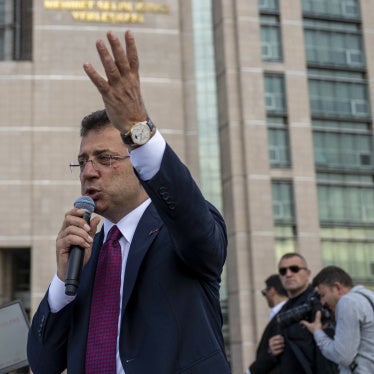(Moscow) – Russian authorities should immediately investigate the actions of officials who prevented Russian activists for indigenous peoples’ rights from traveling to a United Nations event, Human Rights Watch said.
The activists, scheduled to speak at the UN World Conference on Indigenous Peoples on September 22 and 23, 2014, in New York, said that on both September 18 and 20, Russian border officials damaged their passports as they sought to board their plane in Moscow and prevented them from leaving the country. Other activists were delayed from departing by multiple, unnecessary checks, activists said. The conference is a high-level plenary meeting of the UN General Assembly.
“Preventing indigenous rights experts from speaking at a UN conference goes way beyond official intolerance toward civic activism,” said Tanya Cooper, Russia researcher at Human Rights Watch. “Keeping indigenous activists from getting on the plane to New York is exhibit A for the Kremlin’s heavy-handed crackdown on activists since Vladimir Putin’s return to the presidency.”
On September 18, border officials at Moscow’s Sheremetyevo airport told Rodion Sulyandziga, a member of the Indigenous Peoples’ Global Coordinating Group for the World Conference and director of the Centre for the Support of the Indigenous Peoples of the North, that he could not leave Russia because his passport was damaged.
Sulyandziga told Human Rights Watch that he checked in for his flight at 1 p.m. and proceeded to passport control at 1:30 p.m. After he handed over his passport, the border control officer left the booth with Sulyandziga’s passport. Fifteen minutes later, border officials took him to a private room, where they told him that his passport was missing a page. He said his passport had been intact when he gave it to passport control officials but that when he looked, he saw that a page had been sliced out.
Sulyandziga said the officials told him that his passport was invalid and asked him to sign an explanatory note acknowledging that his passport was missing a page. He refused. An hour later, the border officials brought a protocol, signed by two Federal Security Services officials, stating that his passport had been confiscated and that Sulyandziga was charged under paragraph 1 of article 18.1, “Violating the regime of state borders,” of the Russian Code of Administrative Offenses.
On September 20, another Russian delegate to the UN conference, Anna Naikanchina, was stopped at Sheremetyevo passport control under similar circumstances. Naikanchina told Human Rights Watch that although she handed over an intact passport, the border guard told her that her passport was cut in four places and is therefore void. Naikanchina alleges that the official cut her passport while she was looking through her documents to find her child’s birth certificate.
Officials held Naikanchina, who was traveling with her infant, for three hours in a waiting room. Finally, she was told that the authorities had confiscated her “damaged” passport and charged her with the same administrative offense as Sulyandziga. They also wanted her to sign a court summons, but she refused.
Sulyandziga and Naikanchina both face fines of up to 5,000 rubles (about US$135) and have to apply for new passports.
Sulyandziga noted that one of the issues he was supposed to discuss at the UN conference was relations between Russia’s indigenous peoples and oil companies exploring oil reserves in the Arctic region. Naikanchina was supposed to speak at the conference about the issue of respect for the rights of indigenous peoples at the national and local levels.
Three other advocates for the rights of indigenous peoples also experienced interference and delay on the way to various airports as they were leaving for New York. Nadir Bekir, director of the International Foundation for Research and Support of Indigenous Peoples of Crimea, was traveling from Crimea to the Kiev airport when his passport was stolen, Sulyandziga said. Bekir was in a taxi on territory occupied by Russia when a minibus blocked his car and several men he did not recognize stole his passport and left. He missed his flight to New York.
Sulyandziga also said that on September 20, Valentina Sovkina, chairwoman of the Saami Parliament of the Kola Peninsula, discovered the morning of her departure that her tires had been slashed. She took a taxi to the airport, but traffic police stopped her three times, asking to see her travel documents. She missed her flight but managed to get on a later flight. The Moscow Times reported that a fifth person missed her flight to the UN conference after finding her apartment door glued shut while she was out.
Russia is a party to both the European Convention on Human Rights and the International Covenant on Civil and Political Rights (ICCPR), which guarantee the freedoms of expression and association, as well as freedom of movement.
“Did Russian officials hope that putting obstacles in the way of activists leaving the country would keep them silent – whether about Arctic drilling, indigenous rights, or anything else?” Cooper said. “They will not succeed, but they should be immediately held accountable for their arbitrary interference with the activists’ right to freedom of speech.”







